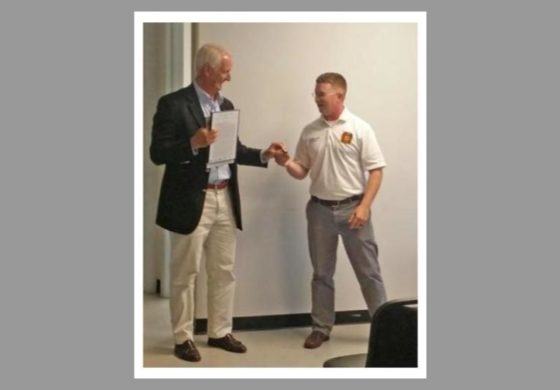By Heather Michon, Correspondent
Just over a year after losing one of their own to cancer, the Kents Store Volunteer Fire Department (KSVFD) family met on Sunday (July 8) to honor his memory and to show their appreciation to those who helped shepherd two bills through the state legislature that will help monitor and possibly prevent cancers among firefighters statewide.
About 40 people joined KSVFD Chief Andrew Pullen in thanking state Sen. Mark Peake (R-Lynchburg) and Delegate Lee Ware (R-Powhatan) for their work on the bills. Gov. Ralph Northam was represented by Ryant Washington, deputy secretary of public safety and homeland security and former Fluvanna sheriff.
Victor Breeden, an 11-year veteran of KSVFD, died in April 2017 after a battle with non-Hodgkins lymphoma. He was just 27 years old.
While there’s no way to know for sure, “a preponderance of evidence indicated he was diagnosed with cancer because of his career,” Pullen said.
If so, he was not alone. According to the Firefighter Cancer Support Network, research shows that career firefighters face a 9 percent greater risk of developing cancer and 14 percent greater risk of dying from cancer than the general population. Cancer is the leading cause of death among firefighters nationwide.
Firefighters face multiple potential contacts with carcinogenic materials, from the toxic contaminants released when modern homes – filled with plastics, electronics, chemicals and synthetics – suddenly combust, to inhaling diesel fumes from their trucks.
Current research shows that the risk lingers long after the fire is put out, as firefighters end up with personal protection gear and equipment covered with toxic soot.
“If I had known 27 years ago that simply washing my gear would have kept me from doing what I had to do, it would have been astronomical,” Louisa firefighter Sean Barrett told the audience. Barrett has been fighting the same cancer that took Breeden.
Late last year, Pullen reached out to Peake, Ware, and other state officials to help get three bills aimed at monitoring and reducing cancers among firefighters through the recent legislative session.
“Andrew has been one of your best advocates,” Peake told the audience.
SB 346 authorizes that money from the Fire Programs Fund can be targeted towards cancer education and training, along with the purchase of additional gear.
“For small rural fire departments like ours, it’s a huge deal,” said Pullen. For KSVFD, it’s meant a second set of turnout gear for each firefighter and better protective gear for the vulnerable head and neck. The bill had no fiscal impact for the state, “but it’s helped every local rural fire department in Virginia.”
SB 347 requires physicians to collect additional data for the Virginia Cancer Registry. Going forward, firefighters diagnosed with cancer will be asked for their work histories, the number of years spent on the job, the approximate number and types of incidents they’ve responded to over the years, and other data points.
“Everyone asks, ‘What’s the data?’” Pullen noted. This bill allows them to collect it.
Another bill, SB 352, failed to pass. It would have added lymphomas and other cancers common to firefighters to the occupational diseases recognized under the Virginia Workers’ Compensation Act. It also would have reduced the requirement that victims have at least 12 years on the job down to five years. This would have been a benefit for men like Breeden, who fell ill after 11 years on the job.
Given the potential fiscal impact, Pullen was not surprised it did not pass. “It got further than I thought it would,” he said. Peake added that it might not pass the next session either, but they would keep introducing it in the hopes of eventually pushing it through.
Pullen handed out framed copies of the bills and other tokens of appreciation.
He also gave Ware and Peake two retired KSVFD fire helmets. “Mark, we may have to wear these in chambers,” said Ware.
“I was just delighted to have a small part in the effort,” he added.





